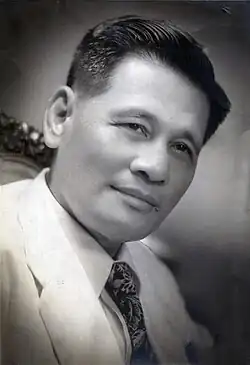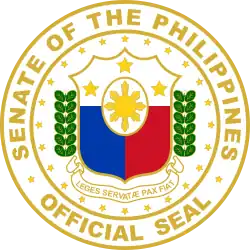José Avelino
José Avelino | |
|---|---|
 | |
| 3rd President of the Senate of the Philippines | |
| In office May 28, 1946 – February 21, 1949 | |
| Preceded by | Manuel Roxas |
| Succeeded by | Mariano Jesús Cuenco |
| President pro tempore of the Senate of the Philippines | |
| In office June 2, 1935 – November 15, 1935 | |
| Preceded by | José Clarín |
| Succeeded by | Senate abolished (Next held by Elpidio Quirino) |
| Senator of the Philippines | |
| In office May 25, 1946 – December 30, 1951 | |
| In office June 5, 1928 – November 15, 1935 | |
| Preceded by | Pastor Salazar |
| Succeeded by | District abolished |
| Constituency | 9th senatorial district |
| Secretary of Public Works and Communications | |
| In office 1939–1941 | |
| President | Manuel L. Quezon |
| Preceded by | Mariano Jesús Cuenco |
| Succeeded by | Basilio Valdes (as Secretary of National Defense, Public Works, Communications and Labor) |
| Secretary of Labor | |
| In office November 15, 1935 – November 1938 | |
| President | Manuel L. Quezon |
| Preceded by | Ramon Torres |
| Succeeded by | Hermenegildo Villanueva |
| Member of the House of Representatives from Samar's 1st district | |
| In office June 6, 1922 – June 5, 1928 | |
| Preceded by | Pedro Mendiola |
| Succeeded by | Tiburcio Tancinco |
| 2nd President of the Liberal Party | |
| In office April 19, 1948 – May 8, 1949 | |
| Preceded by | Manuel Roxas |
| Succeeded by | Elpidio Quirino |
| Personal details | |
| Born | August 5, 1890 Calbayog, Samar, Captaincy General of the Philippines |
| Died | July 21, 1986 (aged 95) Manila, Philippines |
| Political party | Liberal (1946–1986) |
| Other political affiliations | Nacionalista (1928–1946) Democrata (1922–1928) |
| Spouse | Enriqueta Casal |
| Children | 5 |
| Relatives | Paulo Avelino (great-grandson) Coritha (grand daughter) |
| Alma mater | Ateneo de Manila (AB) University of Santo Tomas (LL.B) |
José Dira Avelino Sr. (August 5, 1890 – July 21, 1986), was the first president of the Senate of the Third Republic of the Philippines and the second president of the Liberal Party. Born in Calbayog, he gained a law degree. He started as a municipal councilor of Calbayog and was eventually elected as a representative of Samar. He served as Secretary of Labor and later as Secretary of Public Works and Communications in the 1930s under President Manuel L. Quezon. He was Senate President pro tempore to President Manuel Quezon prior to the establishment of the Commonwealth and was eventually elected as the President of the Senate. In the 1949 Philippine presidential election, he ran but lost in last place. During one of his campaign events, he said a quote named "What are we in power for?" which was controversial. He died on July 21, 1986, at the age of 95.
Early life and career
.jpg)
Avelino was born in Calbayog, Samar to Alfonsa Dira and Baltazar Avelino. Avelino was educated at the Ateneo de Manila, where he received his Bachelor of Arts degree, and the University of Santo Tomas, where he graduated with his Bachelor of Laws. He was admitted to the Philippine Bar in 1934.[1] He was a municipal councilor for Calbayog for one term during 1917 to 1919. He was elected as a representative of Samar's 1st congressional district until 1928.[1]
Secretary of Labor and Public Works and Highways
He served as Secretary of Labor and later as Secretary of Public Works and Communications in the 1930s under President Manuel L. Quezon.[2][3] When he was the Secretary of Labor, Avelino unified the labor unions by organizing them into two commissions: the National Commission of Labor (NCL) and the National Commission of Peasants (NCP) and he was designated chairman of these two commissions in 1938.[4]
Senate
He participated in the 8th Philippine Legislature from 1928 to 1931 representing the Philippines's 9th senatorial district of Leyte and Samar. He then participated in the 9th Philippine Legislature from 1931 to 1934.[5] Avelino is known as the father of the Philippine Workmen’s Compensation Law which he authored during his term in Senate. The bill focused on creating a contingency insurance fund for workers as a way to protect the workers from economic problems.[6] Avelino also founded the first labor union in Eastern Visayas, Gremio Obrero de Stevedores.[7] He was a part of the passage of the Social Security System and pushed for the establishment of public high schools in every province in the Philippines.[7] From 1934 to 1935, he was the President pro tempore of the Senate of the Philippines in the 10th Philippine Legislature after the death of José Clarín.[5] From 1946 to 1949 in the National Senate of the Philippines, he was elected as the president.[5]
1949 presidential election
Avelino ran for the Philippine presidency in the 1949 election, where he became third in a race between incumbent president Elpidio Quirino and former president José P. Laurel. Avelino tried to divide the Liberal Party votes for Quirino by declaring his faction as the other wing of the Liberal Party, but the latter still won with 50.93% of the votes. Avelino garnered a mere 11.85%. His vice-presidential mate, Vicente Francisco, garnered a far lower percentage (1.73%).[8]
"What are we in power for?" quote
Avelino was quoted as saying "What are we in power for?" which was said during a party caucus in Malacañang. The whole statement being: "Why did you have to order an investigation Honorable Mr. President? If you cannot permit abuses, you must at least tolerate them. What are we in power for? We are not hypocrites. Why should we pretend to be saints when in reality we are not? We are not angels. When we die, we will all go to hell. It is better to be in hell because in that place there are no investigations, no secretary of justice, no secretary of the interior to go after us."[9]
The above account is disputed by historian Quintin Doroquez.[10][11] Doroquez claims that Avelino was misquoted as corrupt by Celso Cabrera, a newsreporter who did not speak Spanish.[11] Doroquez claims that Congressman Faustino Tobia of Ilocos Norte confessed to the Avelino family later that the entire quote was fabricated and that the original context of Avelino's comment at the said party caucus on January 15, 1949, was the failure of the Quirino administration to deal with the problems of the country.[11] According to Doroquez, Congressman Tobia offered the following paraphrase as closer to what Avelino actually said in Spanish at the meeting, with the translation being: "Mr. President, is it not the truth that not addressing vigorously these problems is to betray and negate fundamentally our duties as public servants? What for is our mandate from the people?"[11] In any case, the quote "What are we in power for?" was the quote attributed to Avelino and reported in The Manila Chronicle which was owned by the Lopez family, the family of then-senator Fernando Lopez.[11]
Personal life
Avelino was married to Enriqueta Casal and had four sons.[11] He is the great-grandfather of actor Paulo Avelino.[12] Calbayog, his birthplace, became a city in because of Avelino, when, as president of the Senate he pulled together three contiguous municipalities (Oquendo, Calbayog and Tinambacan) and made it into the 19th city of the Philippines, July 15, 1948, the date President Elpidio Quirino signed Republic Act No. 328.[13]
Later life, death, and legacy
After his loss in the 1949 elections, he held a post as an ambassador to Then-President Elpidio Quirino. He then returned to law practice before dying on July 21, 1986, at the age of 95. Honoring his 129th birthday, the Presidential Palace declared August 5, 2019, as a special non-working day in the island of Samar. "The people of Calbayog acknowledge him as The Father of Calbayog City. Together with Congressman Agripino Escareal, he pushed for the creation of the City of Calbayog," the City Information Office said.[6]
References
- ^ a b "Biography of Senate President Avelino". Senate of the Philippines. Retrieved 2025-08-19.
- ^ Guevarra 1995, p. 62.
- ^ The Commercial & Industrial Manual of the Philippines 1938, p. 441.
- ^ Sharma 1985, p. 59.
- ^ a b c "List of Senators". Senate of the Philippines. Archived from the original on 2006-09-14. Retrieved 2025-08-19.
- ^ a b Meniano, Sarwell (2019-08-05). "Samar provinces honor late Senate President Jose Avelino". Philippine News Agency. Retrieved 2025-08-19.
- ^ a b "August 5, 1890: Jose Avelino was born in Calbayog, Samar". The Kahimyang Project. 2025-01-26. Retrieved 2025-08-19.
- ^ Nohlen, Grotz & Hartmann 2001.
- ^ Dante 2006, p. 161.
- ^ Doroquez, Quintin L. (3 November 2007). "Remembering Jose Avelino: A heartbeat away from the presidency (Part 1)". Gugma Han Samar. Retrieved 9 June 2015.
- ^ a b c d e f Doroquez, Quintin L. (3 November 2007). "Remembering Jose Avelino: A heartbeat away from the presidency (Part 2)". Gugma Han Samar. Retrieved 9 June 2015.
- ^ Garzon, Van (2021-05-20). "Paulo Avelino". PhilNews. Retrieved 2025-08-19.
- ^ "October 16, 1948, Calbayog bacame a city". The Kahimyang Project. 2013-09-16. Retrieved 2025-08-19.
Bibliography
- Guevarra, Dante G. (1995). History of the Philippione Labor Movement. Rex Bookstore, Inc. ISBN 978-971-23-1755-2.
- Sharma, Basu (1985). Aspects of Industrial Relations in ASEAN. Institute of Southeast Asian. ISBN 978-9971-902-94-0.
- The Commercial & Industrial Manual of the Philippines . Publishers Incorporated Manila. 1938.
- Dante, Simbulan (2006). The Modern Principalia: The Historical Evolution of the Philippine Ruling Oligarchy. University of Hawaii Press. ISBN 9715424961.
- Nohlen, Dieter; Grotz, Florian; Hartmann, Christof (15 Nov 2001). Elections in Asia and the Pacific : A Data Handbook: Volume II: South East Asia, East Asia, and the South Pacific. OUP Oxford. ISBN 978-0-19-924959-6.
